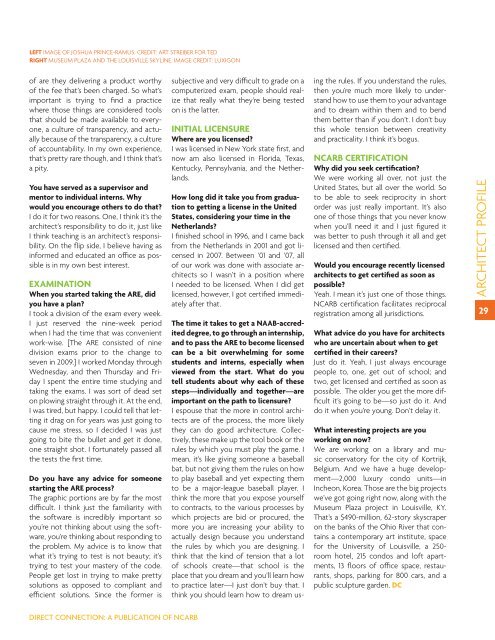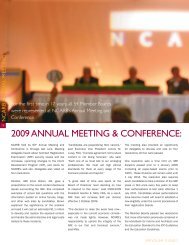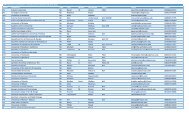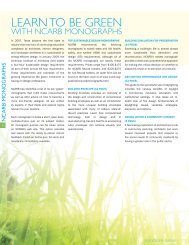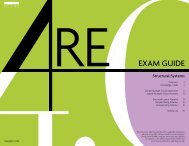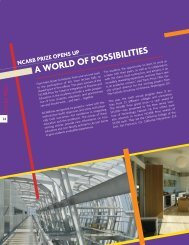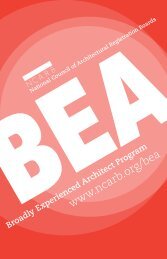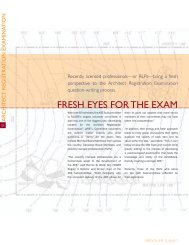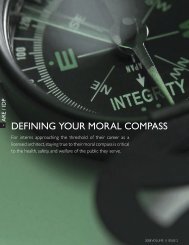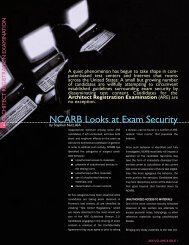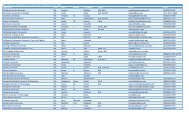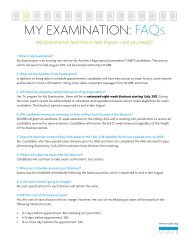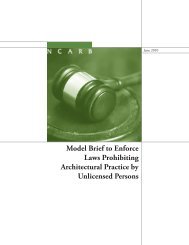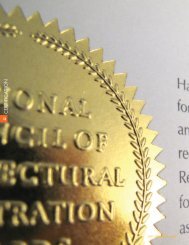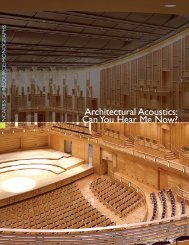JOSHUA PRINCE-RAmUS, NCARB
JOSHUA PRINCE-RAmUS, NCARB
JOSHUA PRINCE-RAmUS, NCARB
You also want an ePaper? Increase the reach of your titles
YUMPU automatically turns print PDFs into web optimized ePapers that Google loves.
leFt IMAGE OF <strong>JOSHUA</strong> <strong>PRINCE</strong>-RAMUS. CREDIT: ART STREIBER FOR TED<br />
riGht MUSEUM PLAZA AND THE LOUISVILLE SKyLINE. IMAGE CREDIT: LUxIGON<br />
of are they delivering a product worthy<br />
of the fee that’s been charged. So what’s<br />
important is trying to find a practice<br />
where those things are considered tools<br />
that should be made available to everyone,<br />
a culture of transparency, and actually<br />
because of the transparency, a culture<br />
of accountability. In my own experience,<br />
that’s pretty rare though, and I think that’s<br />
a pity.<br />
you have served as a supervisor and<br />
mentor to individual interns. why<br />
would you encourage others to do that?<br />
I do it for two reasons. One, I think it’s the<br />
architect’s responsibility to do it, just like<br />
I think teaching is an architect’s responsibility.<br />
On the flip side, I believe having as<br />
informed and educated an office as possible<br />
is in my own best interest.<br />
examination<br />
when you started taking the are, did<br />
you have a plan?<br />
I took a division of the exam every week.<br />
I just reserved the nine-week period<br />
when I had the time that was convenient<br />
work-wise. [The ARE consisted of nine<br />
division exams prior to the change to<br />
seven in 2009.] I worked Monday through<br />
Wednesday, and then Thursday and Friday<br />
I spent the entire time studying and<br />
taking the exams. I was sort of dead set<br />
on plowing straight through it. At the end,<br />
I was tired, but happy. I could tell that letting<br />
it drag on for years was just going to<br />
cause me stress, so I decided I was just<br />
going to bite the bullet and get it done,<br />
one straight shot. I fortunately passed all<br />
the tests the first time.<br />
Do you have any advice for someone<br />
starting the are process?<br />
The graphic portions are by far the most<br />
difficult. I think just the familiarity with<br />
the software is incredibly important so<br />
you’re not thinking about using the software,<br />
you’re thinking about responding to<br />
the problem. My advice is to know that<br />
what it’s trying to test is not beauty; it’s<br />
trying to test your mastery of the code.<br />
People get lost in trying to make pretty<br />
solutions as opposed to compliant and<br />
efficient solutions. Since the former is<br />
subjective and very difficult to grade on a<br />
computerized exam, people should realize<br />
that really what they’re being tested<br />
on is the latter.<br />
initial licensure<br />
where are you licensed?<br />
I was licensed in New york state first, and<br />
now am also licensed in Florida, Texas,<br />
Kentucky, Pennsylvania, and the Netherlands.<br />
how long did it take you from graduation<br />
to getting a license in the united<br />
states, considering your time in the<br />
netherlands?<br />
I finished school in 1996, and I came back<br />
from the Netherlands in 2001 and got licensed<br />
in 2007. Between ’01 and ’07, all<br />
of our work was done with associate architects<br />
so I wasn’t in a position where<br />
I needed to be licensed. When I did get<br />
licensed, however, I got certified immediately<br />
after that.<br />
the time it takes to get a naab-accredited<br />
degree, to go through an internship,<br />
and to pass the are to become licensed<br />
can be a bit overwhelming for some<br />
students and interns, especially when<br />
viewed from the start. what do you<br />
tell students about why each of these<br />
steps—individually and together—are<br />
important on the path to licensure?<br />
I espouse that the more in control architects<br />
are of the process, the more likely<br />
they can do good architecture. Collectively,<br />
these make up the tool book or the<br />
rules by which you must play the game. I<br />
mean, it’s like giving someone a baseball<br />
bat, but not giving them the rules on how<br />
to play baseball and yet expecting them<br />
to be a major-league baseball player. I<br />
think the more that you expose yourself<br />
to contracts, to the various processes by<br />
which projects are bid or procured, the<br />
more you are increasing your ability to<br />
actually design because you understand<br />
the rules by which you are designing. I<br />
think that the kind of tension that a lot<br />
of schools create—that school is the<br />
place that you dream and you’ll learn how<br />
to practice later—I just don’t buy that. I<br />
think you should learn how to dream using<br />
the rules. If you understand the rules,<br />
then you’re much more likely to understand<br />
how to use them to your advantage<br />
and to dream within them and to bend<br />
them better than if you don’t. I don’t buy<br />
this whole tension between creativity<br />
and practicality. I think it’s bogus.<br />
ncarb certiFication<br />
why did you seek certification?<br />
We were working all over, not just the<br />
United States, but all over the world. So<br />
to be able to seek reciprocity in short<br />
order was just really important. It’s also<br />
one of those things that you never know<br />
when you’ll need it and I just figured it<br />
was better to push through it all and get<br />
licensed and then certified.<br />
would you encourage recently licensed<br />
architects to get certified as soon as<br />
possible?<br />
yeah. I mean it’s just one of those things.<br />
<strong>NCARB</strong> certification facilitates reciprocal<br />
registration among all jurisdictions.<br />
what advice do you have for architects<br />
who are uncertain about when to get<br />
certified in their careers?<br />
Just do it. yeah, I just always encourage<br />
people to, one, get out of school; and<br />
two, get licensed and certified as soon as<br />
possible. The older you get the more difficult<br />
it’s going to be—so just do it. And<br />
do it when you’re young. Don’t delay it.<br />
what interesting projects are you<br />
working on now?<br />
We are working on a library and music<br />
conservatory for the city of Kortrijk,<br />
Belgium. And we have a huge development—2,000<br />
luxury condo units—in<br />
Incheon, Korea. Those are the big projects<br />
we’ve got going right now, along with the<br />
Museum Plaza project in Louisville, Ky.<br />
That’s a $490-million, 62-story skyscraper<br />
on the banks of the Ohio River that contains<br />
a contemporary art institute, space<br />
for the University of Louisville, a 250-<br />
room hotel, 215 condos and loft apartments,<br />
13 floors of office space, restaurants,<br />
shops, parking for 800 cars, and a<br />
public sculpture garden. Dc<br />
ARCHITECT PROFILE<br />
29<br />
DIReCT CoNNeCTIoN: A PuBlICATIoN oF <strong>NCARB</strong>


